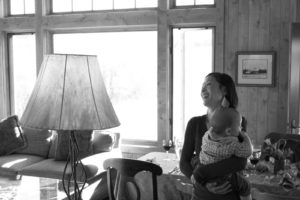As one who reunited with my Korean parents in 2009, I most often refer to my Korean parents as, well, my Korean parents. I call my Korean father by either Korean father or Appa, and I call my Korean mother by either Korean mother or Omma. However, I do at times employ the terms biological and/or birthmother/father when the context of adoption is not already understood by the person or people with whom I’m conversing. I, then, eventually switch to saying Korean or American parents once the context is clear. With whom I am talking and the context of the interaction often affects what term I might choose to use. Some may call this wishy-washy; I call it survival and stress management.
I have to admit that biological sounds very cold and aloof to me. Because I am a deeply emotional person and feel a profound emotional connection to my Korean parents and family, I do not prefer the term biological. Furthermore, the term birthmother/father/family can carry other patronizing connotations with it with which some feel very uncomfortable. I honestly have never felt very patronized or emotionally negative toward this term, but I understand why others do. Particularly, I understand why the first/original mother/father would feel patronized by this term.
I rarely use the terms real or natural simply because, for me personally, psychologically, and emotionally these terms feel too divisive and diminutive in either direction. I’ve actually heard real and natural used in the context of describing both adoptive and biological parents. In my own personal encounters with different people, I’ve heard people refer to my Korean parents as my real or natural parents as well as to my American parents as my real or natural parents.
If forced into a corner and demanded to make a distinction (which is a whole other pesky and irritating issue that surrounds being an adoptee), I would have to honestly say that, in my case, I consider both sets of parents–both my Korean and my American parents–to be my real and natural parents. I know that there are others who would take issue with this, and that’s understandable. The adoptee experience is so diverse and varied that we must consider and acknowledge the validity of each adoptee’s viewpoint and experience, particularly when those experiences and viewpoints differ. Failure to do so dismisses the inherent complexities and realities of the adoption experience. Of course, these relationships with my two sets of parents are complex and imperfect, laden with unresolved issues and dysfunction. But, nonetheless, I personally consider all four of them as my parents. Certainly and obviously, our relationships are characterized by different dynamics, histories, and roles. Yet, ultimately, I prefer to use none of the above identifiers, but rather simply to refer to them as my parents.
But, of course, it’s not that simple, and I often do feel compelled, or I am in some ways often required, or at least prodded and pried, to clarify and make distinctions to those addressing me. I make efforts to simply say in conversation my American parents and/or my Korean parents because that is what feels most natural and real to me. And, honestly, I wish that was simply enough. But, in adoption, rarely are things simple and rarely is one option enough.
 Mila is a wife, mother, daughter, sister, friend, as well as a Korean adoptee. She was born in Seoul, South Korea in 1975 and adopted by a White American family 6 months later. She has been in reunion with her Korean family since 2009. You can hear Mila’s voice at collective site Transracial Eyes where she serves as one of 20+ adult adoptee contributors.
Mila is a wife, mother, daughter, sister, friend, as well as a Korean adoptee. She was born in Seoul, South Korea in 1975 and adopted by a White American family 6 months later. She has been in reunion with her Korean family since 2009. You can hear Mila’s voice at collective site Transracial Eyes where she serves as one of 20+ adult adoptee contributors.
